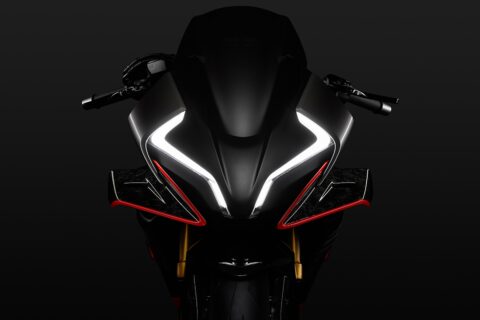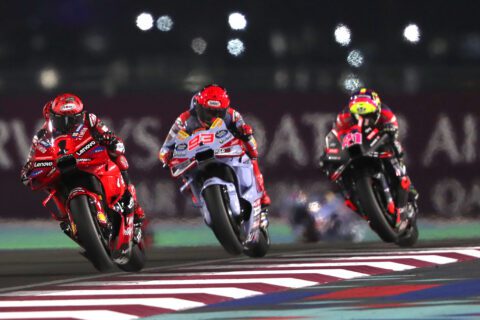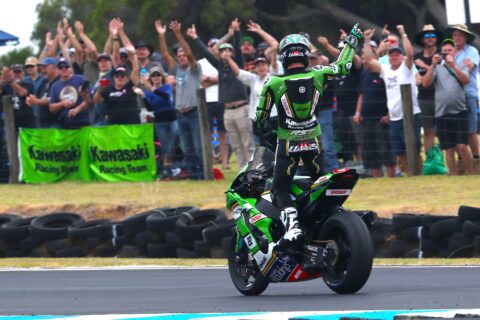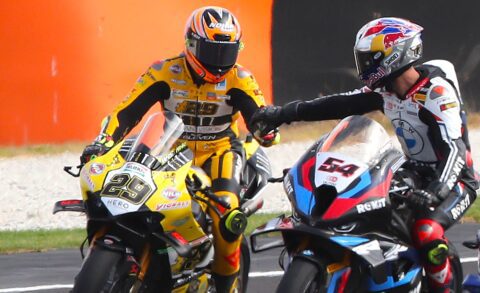THE RACE DIRECTOR'S DILEMMA
As I was saying before being rudely interrupted (by holidays), running a racing circuit is no fun. Stuart Higgs, race director for BSB, rediscovered this at Brands Hatch last weekend when he had to make the sort of judgement call which officials like him are paid to do - abandon qualifying as riders fell like nine-pins or just get it over with.
It is not as simple as that, of course, and he denied that Eurosport televising BSB qualifying was the major factor in his decision to keep going. But it is, nevertheless, a big decision from which race directors can end up in court, being sued by riders, their families or even spectators, if things go wrong. And there are plenty of wiseacres who, after the event, will trumpet their wisdom with all the benefit of 20/20 hindsight.
But it was a close call. Fortunately, although there were many crashes - Josh Brookes scored a hat-trick and then added another one in the first race - and Higgs got a tongue-lashing from Shane Byrne who, following one of his 'offs,' seemed to be attempting to stop the session.
As countless riders picked their bikes from the gravel, various reasons for the mayhem were argued including the obvious - it was wet and the track temperature was cold, very cold. One theorist suggested the wet weather rear tyres were not designed for the English winter, another that not enough rubber was on the track, a third that too much rubber had been put down by previous useage.
Tyres are undoubtedly the one piece of equipment which has changed racing more than any other, for the better and the worse. When some forms of racing, road racing in particular, aren't allowed to start because of a threat of rain then fresh thinking is required, and organisers who contract with a single tyre manufacturer should dictate what they require. This applies to world championships, national championships, club events and even the TT. Especially the TT.
Higgs was in a no-win situation. But I bet he blew a big sigh of relief when the qualifying at Brands was over.
AGE IS JUST A NUMBER, ISN'T IT?
What is a man of 55 doing contesting the nation's premier road racing championship? Peter Baker may be a young 55, even a fast 55. But as he was being lapped by the leaders in the second leg of the British Superbike Championship at Brands Hatch he appeared to impede Josh Brookes as he was challenging Byrne for the lead with a lap to go.
It might be argued that many younger riders get in the way and without blue flags to warn them it is inevitable, particularly on a circuit less than a mile long. But even Eurosport commentator Jack Burnicle, not unfamiliar with advancing years, seemed somewhat questioning of the wisdom of allowing someone on the same track as the fastest riders in the country, many half his age or less.
Is there something under the age discrimination act which prevents limits being applied? In that case, of course, 17-year-old Harry Hartley might be deemed to young or too inexperienced. Just for the record Mr Baker finished 26th and 22nd respectively, Master Hartley 18th and 13th.
ENTERTAINERS OR INFORMERS
What is the purpose of the people who present sport on our television screens? Are they there to entertain, to build up the excitement; or to inform, to tell us what is going on?
The appointment of Melanie Sykes to 'anchor' BTs MotoGP coverage was a controversial move causing the afficianados to splutter into their pints. "What does that bloody woman know about motorbike racing?” was the chorus.
Eurosport, on the other hand, took the safer route. Having decided to dispense with one motorbike journo,Tony Carter, they employed another. Channel boss Dave Kerr declared rather snootily, in this week's Bikeport News magazine, that they wanted someone who knew something about the sport for their audience of experts. He infers that Mad Mel would not have been their choice. Instead they hired Matt Roberts, on the job market following the BBC's decision not to pay enough to retain their MotoGP contract.
Now, in the good old days of steam radio (now attracting bigger audiences than ever by the way) commentators had to describe what was going on because listeners could only hear not see.
Now everyone can see for themselves what is going on but many commentators get so carried away with their own verbosity they forget that their job is to tell their audience what they can't see or might not understand - the rules of the game being a case in point.
But back to entertainers or informers. Our sport is spectacular and what draws fans in their thousands is the excitement.
Commentators or pundits, even though they are 'experts,' should reflect that. They should tell us what we don't know/can't see but more importantly they should sound, in not too many words, as if they are witnessing something they love and which makes their heart beat faster.
It is the job of the 'anchor,' as the orchestrator, to translate that knowledge and enthusiasm. So Mel, the entertainer, or Matt, the informer? Seconds out…










